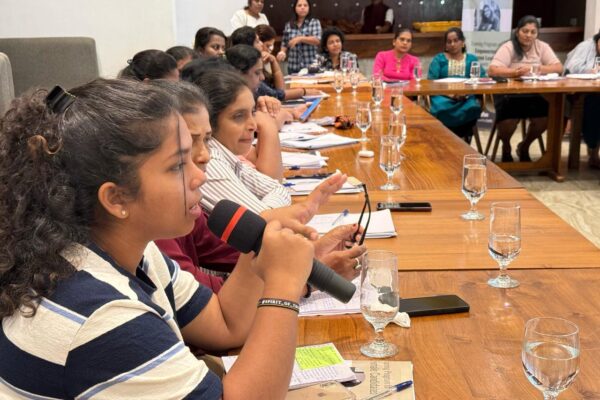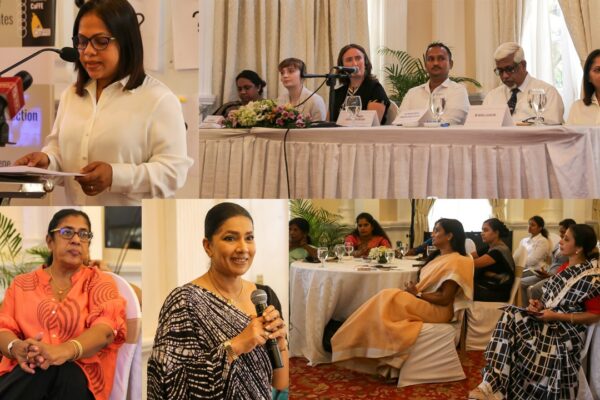Campaign for Free and Fair Elections (CaFFE) held the first meeting of the Advisory Board for its Janani initiative on 02 November 2021 with the participation of Former Minister Ferial Ashroff, Former State Minister Vijayakala Maheswaran, MP Rohini Kavirathne, MP Thalatha Atukorale, Former MP Hirunika Premachandra, Urban Councillor Samanmali Gunasinghe and Senior Research Fellow at LIRNEasia, Dr. Sujata Gamage.
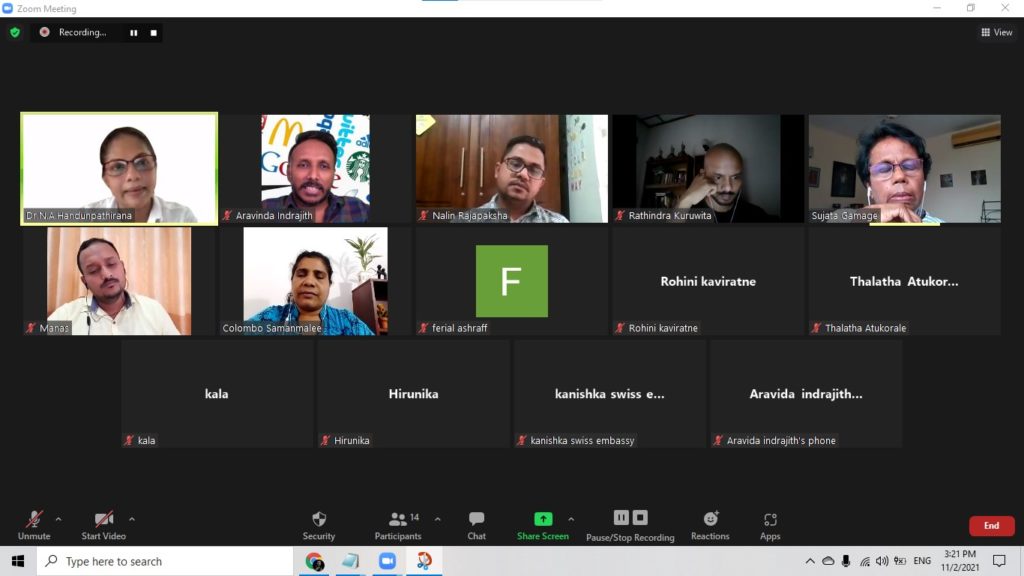
The Advisory Board is a collective of female leaders that will assist CaFFE in formulating the overall direction of the Janani initiative, which is earmarked to combat online harassment of grassroots female political activists through education and creating support structures. The first meeting focused on CaFFE’s ongoing research on digital harassment faced by grassroots female political activists, sharing personal experiences and on providing CaFFE with practical assistance to successfully conduct its workshops at the grassroots.
A lively discussion took place and the session went on close to three hours, although CaFFE has only scheduled the meeting for two hours.
Importance of Research
The Advisory Board members agreed that the lack of empirical data on digital harassment of grassroots female political activists was a major stumbling block in addressing this issue and that CaFFE research comes at an important time when internet use has skyrocketed due to the COVID-19 pandemic.
Dr. Sujata Gamage said that there was an attempt to conduct a similar research a few years ago but it never materialized. Given that COVID 19 had increased the amount of people online, there would have been a spike in digital harassment, she said. CaFFE’s research would be vital for future researchers and policy makers she said.
Dr. Gamage added that further research should cover all 25 districts of the country and must encompass female political activists and politicians at all levels.
Personal experiences
All female politicians had personal experiences of digital harassment. The fact that almost everyone of them come from a political background and places of privilege played a significant role in mitigating the adverse effects of digital harassment. However, even then former MP Hirunika Premachandra had to leave social media, a medium she had used extensively for campaigning.
Former State Minister Vijayakala Maheswaran, MP Rohini Kavirathne, MP Thalatha Atukorale, Former MP Hirunika Premachandra, Urban Councillor Samanmali Gunasinghe said that the harassment those at the grassroots is more severe as there are no supporting structures to help them overcome the negativity created.
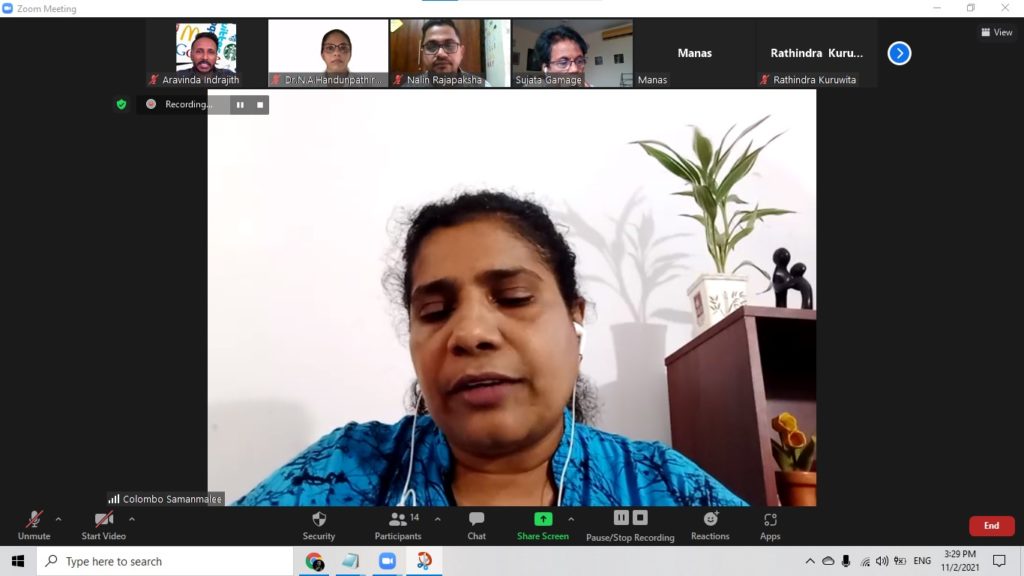
Urban Councillor Samanmali Gunasinghe said that when someone becomes popular there are many detractors, but there are not a lot of people support. Many Sri Lankans believe that women should be relegated to housework and looking after the children. There is reluctance to believe that she has a role in the world of work and that she has a role as a citizen.
MP Thalatha Atukorale said that at a time when internet connectivity is rising, and many women play political roles due to the quota system introduced for local councils in 2018, CaFFE’s initiative was timely.
During her time as the Justice Minister, she tried to bring a law on fake news but wth the change in government the initiative stalled, Atukorale said. “Internet has spread very fast. It wasn’t this bad 10-12 years ago. However now, in the last 5-6 years digital harassment has become a main problem. Other countries have laws to address these issues, here we are very far behind,” she said.
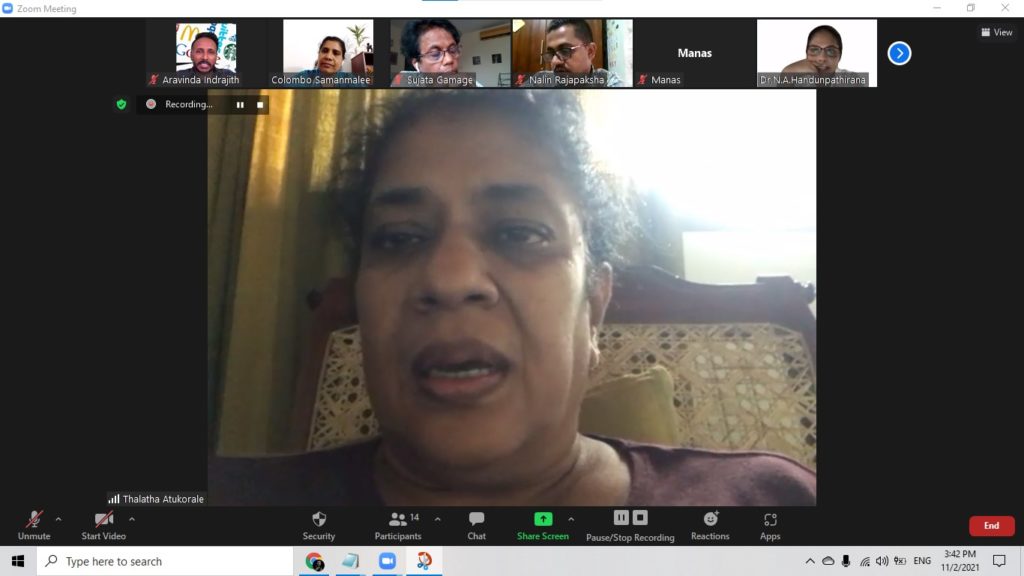
She said that during her tenure as the Minister of Foreign Employment, there were concerted attacks against her online and that even now there is systematic campaign to portray as an unscrupulous politician. “Most people think women need to stay in the kitchen. Although this attitude is prevalent in every strata, these attitudes affect rural women more. Party seniors at the provincial level are angry that there are a lot of women in local councils and that they are behind some of the harassment faced by these women,” she said.
The younger generation is addicted to the internet and they are not educated to become responsible Netizens. Civil society organizations too need to play a role in educating youth on becoming better Netizens, Atukorale said.
MP Rohini Kavirathne said that some female politicians were planning to leave politics because of digital harassment and that she had to personally intervene on several occasions to change their minds.
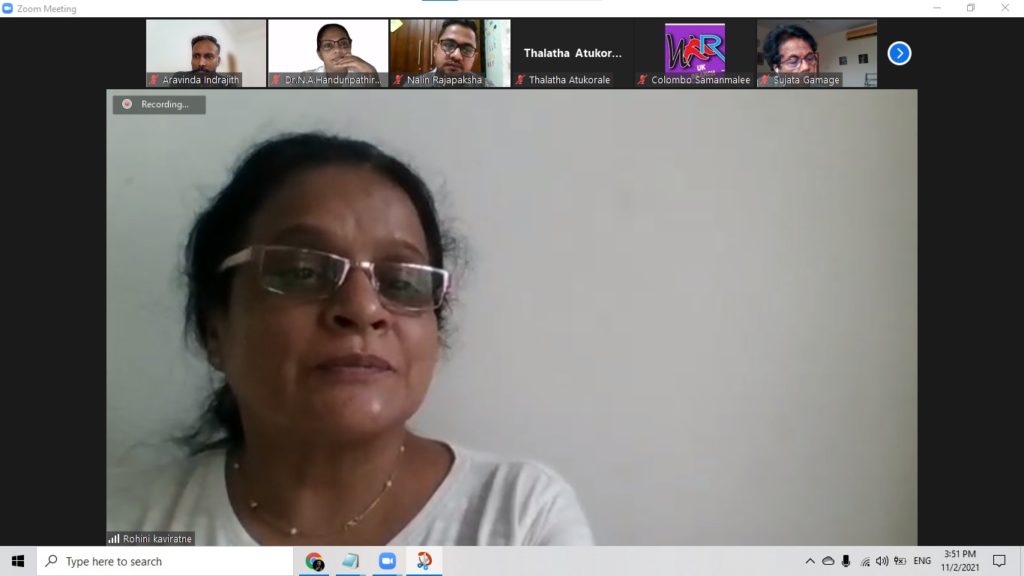
“Internet is a good platform to get the message across. Politicians, especially female ones, can save a lot of money. Its easier to reach people as most people now have smart phones. However on the other hand, among the most popular posts on the internet are those that attack women. Women need a lot of money to win. The attitude of party leaders towards women. Very hard to get nominations. I come from a political background but it was hard for me. They want to bet on someone they think they will win,” she said.
The MP added that although female politicians are more efficient and more productive than their male counterparts, this is not the impression people have of them. “If there are no laws, then we have to strengthen our minds. CaFFE can help women to become stronger through education and providing support structures. I am willing to be a part of CaFFE’s initiative,” she said.
former MP Hirunika Premachandra said that she was one of the people who faced a lot of attacks on social media. While social media is a tool that can be used for good, it can also cause significant damage. She added that grassroots female political activists need to be educated and empowered and be taught to see the positives. Although there are a large number of people who harass grassroots female political activists online, most of these are accounts that are run in troll farms, she said.
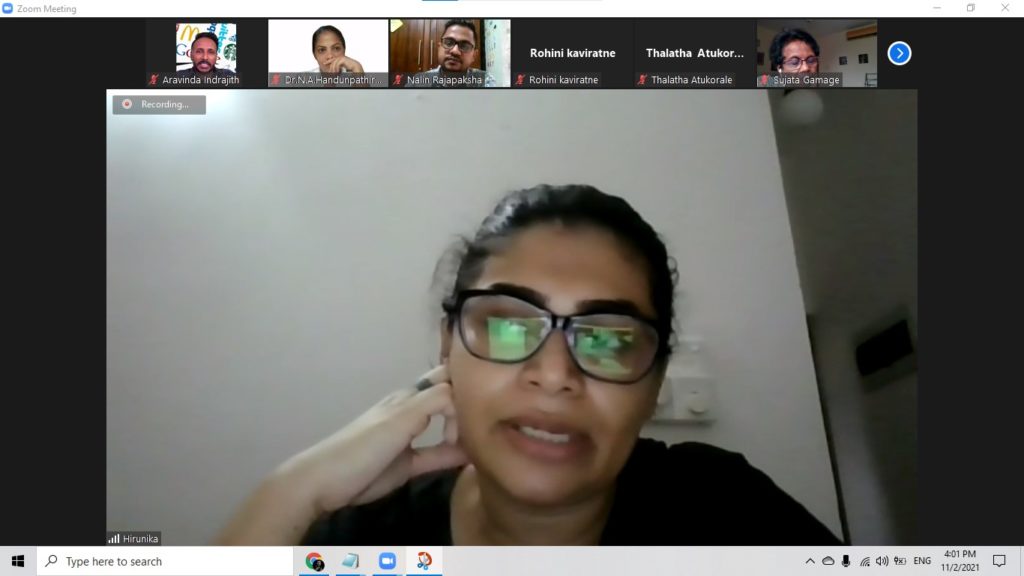
“Most of these comments are same. In fact, same phrases are used by the same accounts to attack different politicians. Most of these are newly created accounts. We must also realize that there are hundreds of people saying positive things about us, but the human mind is such we only focus on the negative comments,” she said,
There should be a mechanism to protect women and children and that each police station needs to have a dedicated unit working on digital harassment and female officers need to be attached to these, the former MP said.
Former State Minister Vijayakala Maheswaran said that the digital harassment faced by female political activists often come from supporters of other politicians. Senior party leaders are not interested in allowing women to come into politics. A lot of women want to enter politics but do not do so because of online and offline harassment, she said.
Former Minister Ferial Ashroff said that unfortunately many people do not believe that women should engage in politics and that CaFFE and like minded organizations should carryout counter-narrative campaigns against those who undermine women online.
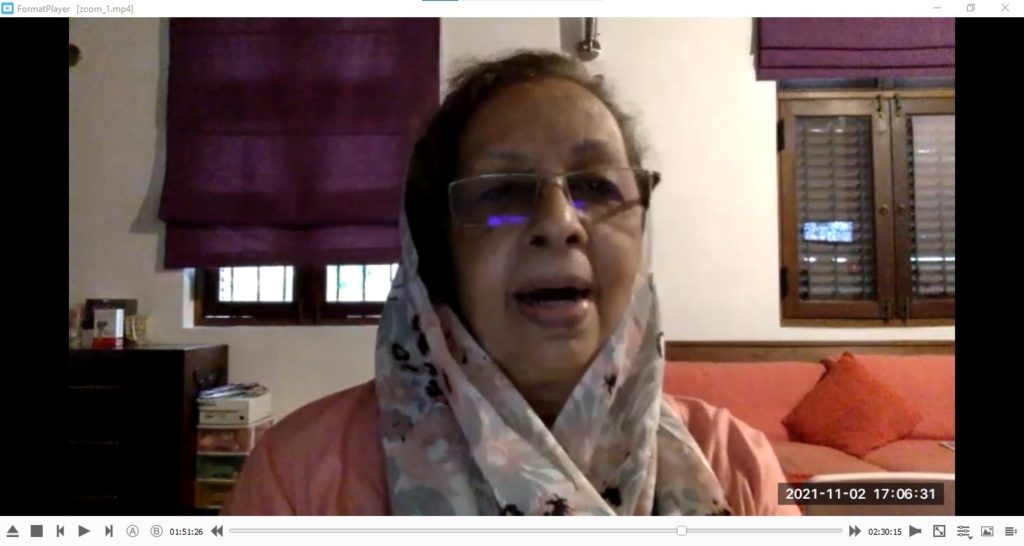
“For a country to develop, women need to be in decision making positions. Women need to understand why they need to be in politics. There is a big difference in the way men and women react to any issue. We must develop an organization to encourage women to be in politics,” she said.
Proposals
Dr. Sujata Gamage said that the social media can be used by politician’s propaganda and to provide services. Women must be taught how to do these safely. “We need to learn how to use internet well. These are leaders not victims. We have to strengthen their minds,” she said.
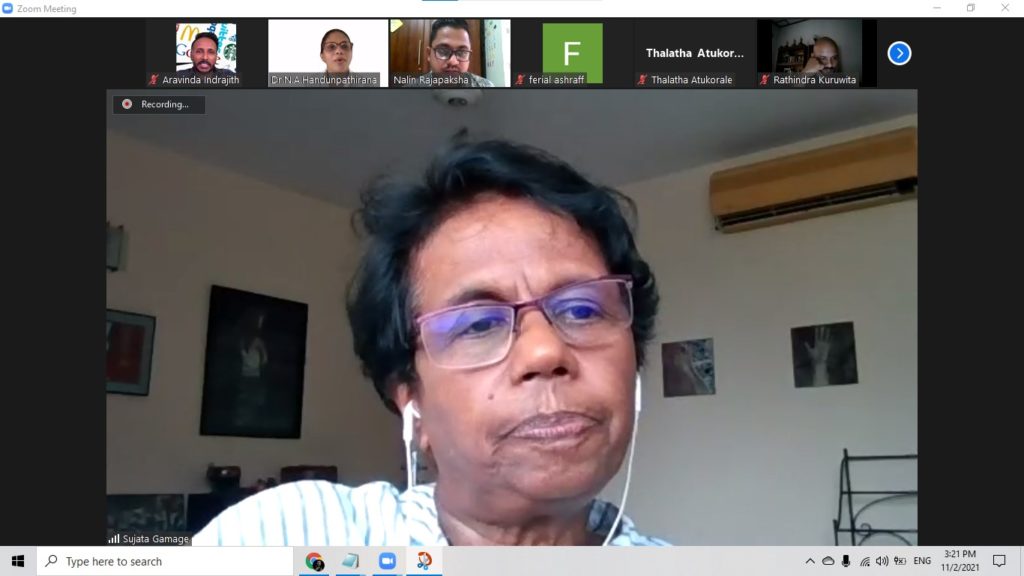
Meanwhile, MP Rohini Kavirathne offered several proposals for CaFFE to include in the workshops for grassroots political activists. These are; What is the role of women in politics, why should women be encouraged, why we need to educate the society, teach political activists the new challenges they face and how to respond to digital harassment.

